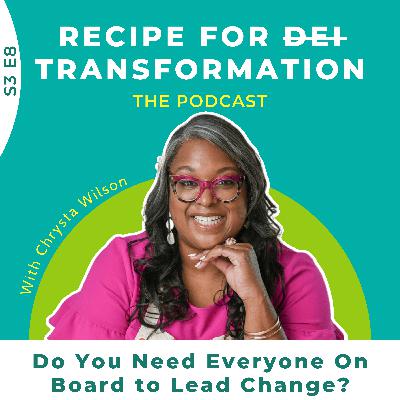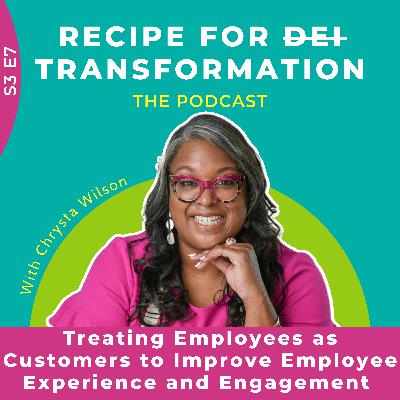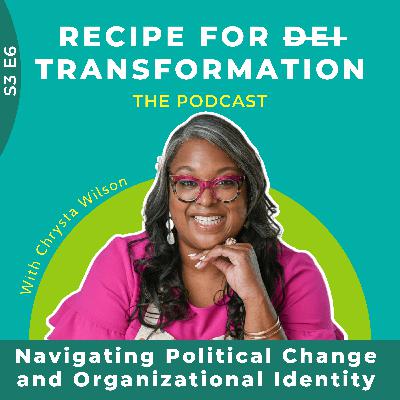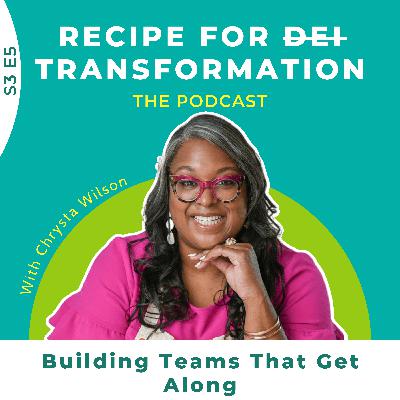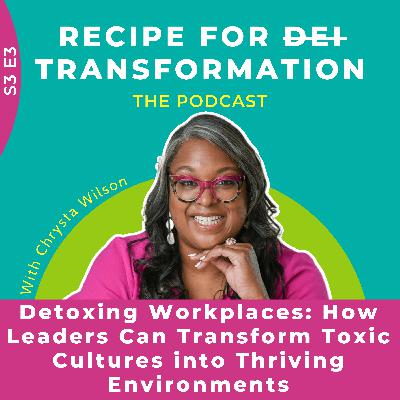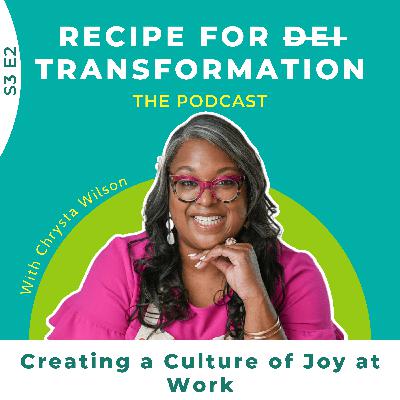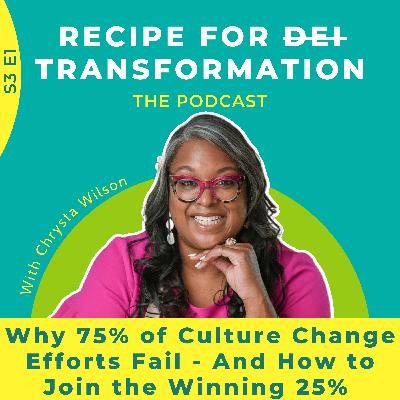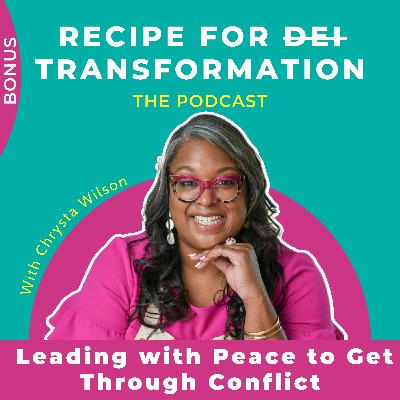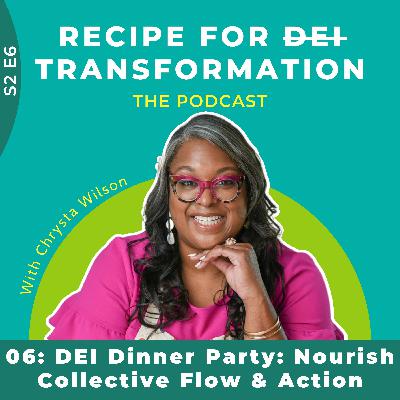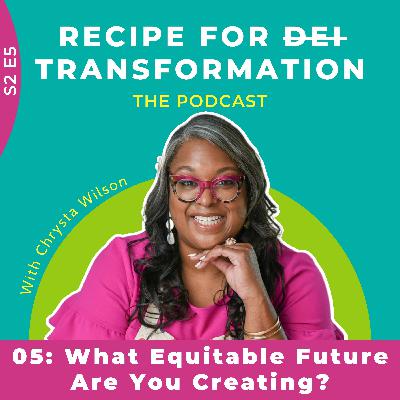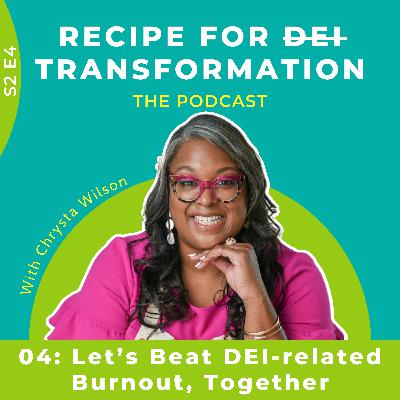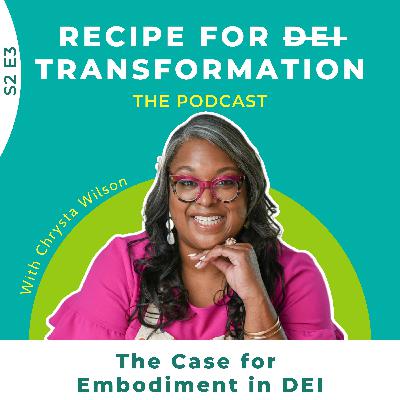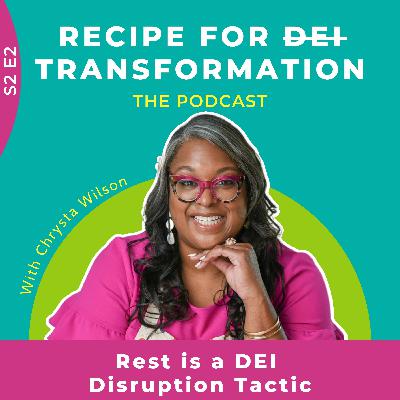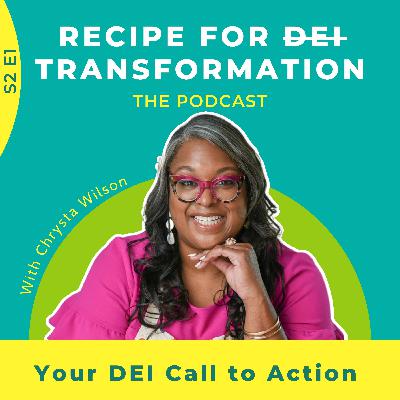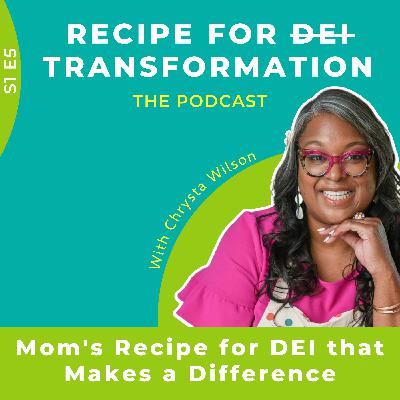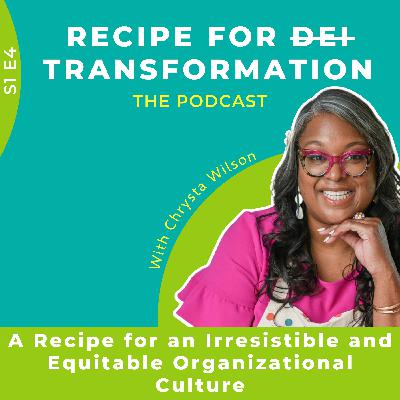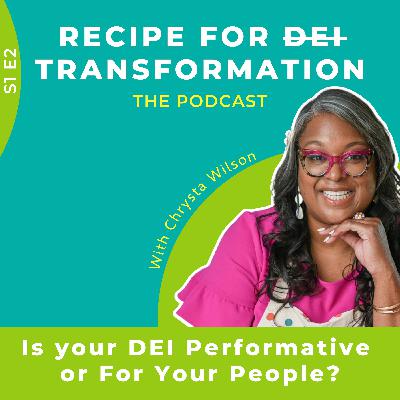Discover A Recipe For Transformation
A Recipe For Transformation

A Recipe For Transformation
Author: Chrysta Wilson
Subscribed: 2Played: 1Subscribe
Share
© Copyright 2025 Chrysta Wilson
Description
For leaders navigating change, shaping culture, and leading with humanity.
Recipe for Transformation is the podcast for people-first leaders who are guiding their teams through uncertainty, culture shifts, and organizational change. Hosted by culture transformation strategist Chrysta Wilson, each season explores the practical and powerful ingredients required to build resilient teams, inclusive environments, and values-aligned leadership—especially when things get hard.
In a world where change is constant and culture is too often accidental, this podcast offers the tools, insights, and frameworks to lead intentionally and shape workplaces where people—and purpose—thrive.
What You Can Expect:
**Real talk on leading through disruption — change management, culture repair, and crisis response
**Stories from the field — insights from leaders building strong, inclusive, human-centered teams
**Leadership lessons — the wisdom behind equity-rooted strategy, emotional intelligence, and leading with care
**Tactical takeaways — tools you can use tomorrow to steady your team, navigate conflict, and lead culture change
**Moments of joy + grounding — because if we’re not building workplaces that nourish us, what are we doing?
Chrysta brings over 20 years of experience advising Fortune 500s, governments, and nonprofits through organizational transformation. She’s facilitated over 15,000 hours of change strategy, culture diagnostics, and leadership development rooted in values.
This show was born from a simple truth: Leading well—especially in times of upheaval—requires more than good intentions. It requires clarity, courage, and a clear recipe for transformation.
Whether you’re managing through burnout, culture breakdowns, restructuring, or just trying to lead your team with integrity in an unpredictable world, this podcast is for you.
Learn more:
www.wilson-and-associates.com
Let’s reimagine how we lead, together.
Recipe for Transformation is the podcast for people-first leaders who are guiding their teams through uncertainty, culture shifts, and organizational change. Hosted by culture transformation strategist Chrysta Wilson, each season explores the practical and powerful ingredients required to build resilient teams, inclusive environments, and values-aligned leadership—especially when things get hard.
In a world where change is constant and culture is too often accidental, this podcast offers the tools, insights, and frameworks to lead intentionally and shape workplaces where people—and purpose—thrive.
What You Can Expect:
**Real talk on leading through disruption — change management, culture repair, and crisis response
**Stories from the field — insights from leaders building strong, inclusive, human-centered teams
**Leadership lessons — the wisdom behind equity-rooted strategy, emotional intelligence, and leading with care
**Tactical takeaways — tools you can use tomorrow to steady your team, navigate conflict, and lead culture change
**Moments of joy + grounding — because if we’re not building workplaces that nourish us, what are we doing?
Chrysta brings over 20 years of experience advising Fortune 500s, governments, and nonprofits through organizational transformation. She’s facilitated over 15,000 hours of change strategy, culture diagnostics, and leadership development rooted in values.
This show was born from a simple truth: Leading well—especially in times of upheaval—requires more than good intentions. It requires clarity, courage, and a clear recipe for transformation.
Whether you’re managing through burnout, culture breakdowns, restructuring, or just trying to lead your team with integrity in an unpredictable world, this podcast is for you.
Learn more:
www.wilson-and-associates.com
Let’s reimagine how we lead, together.
22 Episodes
Reverse
Do you need everyone on board to lead change efforts? In this week's episode, you'll learn more about: The Bell Curve of Change and how it relates to change managementCreating an equation for change managementWhat you do need need to lead change 3 Key takeaways to lead change
In this episode we'll explore how treating employees like customers can enhance employee experience and engagement. We'll explore: the six stages of the client experience treating employees like customers by actively listening to their needs and feedback to improve employee retentionhow you're creating value for your employees and investing in your employee's experiences and their growth
When the laws around your organization shifts, like policies and the laws that are written are changing, cultural norms in the country are being reshaped, how do you decide who you are and who you stand for? What does it mean to support our employees and how do we do that? In this episode, you'll find out more information about:Kenji Yoshino's framework for assessing what kind of workplace culture you want to haveKey considerations for determining who you want to be for your people and what you want to be known forExploring how your organization will decide when to take action versus when to remain neutral
When it comes to teams and employees, you may be wondering if it's necessary for everyone on the team to like each other and to get along for them to do their jobs. You might even be wondering if it is important for everyone at work to be considered family. In this week's episode you'll learnthe benefits of making sure teams get along creating conditions to help teams get along9 tips for how to make sure teams get alongAlso, tune in to find out what my team member, Amber's, solution was for helping her daughters get along.
February is National Storytelling Month! In this week's episode, you'll learn more about storytelling and how it can be used as a powerful team-building and inclusion strategy. We'll look more closely at: The power of storytelling Tools and tactics to build a storytelling practice in your organization starting today!
On our alignment calls with prospective clients. One of the first questions that I asked them is if they're experiencing any aspect of toxic culture and almost immediately we hear no, not here. I always find it interesting one based on my experience over the last 17 years leading organizational culture change work, but also because of a recent study that just came out that said one in 10 employees report experiencing some aspect of toxic culture. In this episode, you'll learn:about what toxic culture isthe shame that's attached to toxic culturehow leaders can lead a cultural detox.
Creating a culture of joy is more than just about feeling good at work. It's a core and data driven strategy for engagement, productivity, and employee wellbeing. In this episode you'll learn about: the concept of joywhy it mattershow you as a leader can foster itdispelling myths about joy
75% of companies that engage in change management efforts fail to see the results they aim for. That means 25 percent are successful. In today's episode you'll learn about the three pillars of our Recipe for Transformationthe three main reasons why change management efforts failand how to avoid these pitfalls.
Ever wondered why diversity and inclusion initiatives often uncover deeper conflicts in organizations? Join Chrysta Wilson in this episode of "A Recipe for Transformation" as she unravels the surprising trends within workplace cultures.From minor sparks to societal conflict aversion, Chrysta explores the challenges organizations face in navigating interpersonal dynamics."Peace is not the absence of conflict; it's a commitment to repair, harmony, and the well-being of all involved." Join the transformative journey towards workplace harmony and subscribe to the podcast for more insights.www.RecipeForTransformation.comConnect with Chrysta:https://www.linkedin.com/in/chrystawilson/https://www.instagram.com/wilsonandassociatesconsulting/
Do you feel lonely being a DEI leader?Social change requires more and more people to step up and lead in order to create a critical mass. We need collective action. We need networks of support and skillsharing. We need coaching and mentorship, ongoing training and a network of peers. DEI champions should not have to feel like they are doing it alone.In episode 6 of A Recipe for Transformation, Chrysta Wilson speaks about creating a movement of outcomes focused leaders through bringing people on the DEI frontline together, highlighting: How learning communities create accelerated change through cross-pollination, building relationships and sharing resources Why learning is enhanced when we learn both from experts and peers The diverse skill set needed by DEI leaders and the challenge of getting comprehensive training for all these skillsThe magic of the collective flow state and how it creates impactWhat happens at the DEI Dinner Party and how it meets the complex needs of the DEI learning community by collapsing time “The reason why learning communities like the DEI Dinner Party are so powerful is that when we come together we activate what’s called the “collective flow state”. When this collective flow state is activated, our awareness is heightened and our ability to move into action is accelerated. Our ability to make connections to concepts bigger than ourselves is now possible. Our mental and physical performance goes through the roof. AND, being in this flow state is associated with a sense of wellbeing and increased happiness.” Chrysta WilsonS2 E6, A Recipe for Transformation www.RecipeForTransformation.comConnect with Chrysta:https://www.linkedin.com/in/chrystawilson/https://www.instagram.com/wilsonandassociatesconsulting/
Do you have goals for DEI in your organization?It’s time to stop thinking of DEI as values and instead think of them as outcomes and conditions that we want to create. To create effective change we need to know where exactly we’re headed and what that looks like so that we can create actions that will lead to that outcome.In episode 5 of A Recipe for Transformation, Chrysta Wilson explores the key shift needed in DEI work at this time and offers us tools for implementing a more tangible DEI procedure, highlighting: Knowing the language is not enough; organizations need a united vision for what they want to create and tangible goals to be able to assess effectiveness The 3 foundational questions organizations need to answer when stepping into DEI workThe party analogy; moving from vision to outcomes and developing concrete goalsThe “best guess”; analyzing the gap between present reality and the DEI vision and creating targeted activities to create the desired changes The 3 questions that help create actions with tangible DEI outcomes "If you do DEI activities without a vision, without clear outcomes, you’re missing out on a real transformation. If you don’t have a clear goal or vision for DEI, how will you know what you’re working towards? Dream up your future state. What would diversity look like? What needs to change? And what needs to be created?” Chrysta WilsonS2 E5, A Recipe for Transformation www.RecipeForTransformation.comConnect with Chrysta:https://www.linkedin.com/in/chrystawilson/https://www.instagram.com/wilsonandassociatesconsulting/
Is your DEI work leaving you feeling exhausted?Ongoing exhaustion related to work is termed “burnout” and is characterized as chronic workplace stress that has not been successfully managed. DEI work is a long-game and requires careful design, diverse resources and deep support to yield meaningful results. In episode 4 of A Recipe for Transformation, Chrysta Wilson speaks to the high risk of burnout for people leading DEI work, how to recognise it, and what needs to change to protect against it, highlighting:Folks engaged in leading DEI work are at at a higher risk of burnout due to the combined challenges of leading culture change, policy change, human behavior modification and systems changeLearning to recognise burnout; the emotional, somatic and behavioral symptoms to watch forThe 5 key things DEI leaders need in order to protect them from burnoutThe critical importance of organizations creating DEI metrics to maintain engagement in DEI effortsDEI leaders need more ongoing support, both personally and professionally to do the long-game work of DEI"Those of us who are leading DEI are even more susceptible to burnout. The reason is because there are unique challenges that come from leading this interdisciplinary type of work where we’re having to look at culture change, policy change, human behavior modification and systems change.” Chrysta WilsonS2 E4, A Recipe for Transformation www.RecipeForTransformation.comConnect with Chrysta:https://www.linkedin.com/in/chrystawilson/https://www.instagram.com/wilsonandassociatesconsulting/
Do you listen to what your body tells you?Our stories are stored in our bodies. Healing requires us to feel, to move, to let our bodies know what they know and to honor their knowing. But so many of us are habitually disconnected from our bodies that it can feel like a major challenge to learn to “listen” more closely to our own bodies, let alone to bring this topic into the workplace and to DEI work.In episode 3 of A Recipe for Transformation, Chrysta Wilson goes into the topic of somatics or embodiment, and reveals why including the body is important in DEI work, highlighting in particular:We know key information in our bodies, often before we know it in our minds; why paying attention to the subtle cues we notice in the body is important.What embodiment / somatics means in the context of DEI work.See the issues, feel the issues; the importance of including healing work in the DEI process and what that means about expanding the nature of the work.Why learning to honor our own bodies is a crucial piece of doing DEI work4 great practices to build a stronger connection with your body "When we’re more connected to our bodies it shows up in how we lead. We’re able to create deeper DEI strategies that address the harms that DEI was aimed to address in the first place. When we forget that we are whole human beings with a body, how can we build a future for all human beings to thrive?” Chrysta WilsonS2 E3, A Recipe for Transformation www.RecipeForTransformation.comConnect with Chrysta:https://www.linkedin.com/in/chrystawilson/https://www.instagram.com/wilsonandassociatesconsulting/
Are you doing DEI work and feeling perpetually exhausted?Research shows that DEI leaders are experiencing record levels of burnout. We’re passionate about it and it’s hard work, so in a way that doesn’t seem surprising. But what if it could be different? What if it HAS to be different for our DEI work to really be effective? In episode 2 of A Recipe for Transformation, Chrysta Wilson explains how disrupting grind culture is an essential part of DEI work, how that work begins in each of us, and how we can start to make those changes, highlighting: The need for reinforcing new, healthier behaviors to change our habits and our culture Why isolation is a key factor in DEI leadership burnout and how we can change thatThe “unsustainable YES” and the reality of staff capacity, mental and physical health, relationships and economic situationHow to shift towards a lifestyle that honors our bodies and minds and creates a sustainable, balanced life Why we cannot do effective DEI work within grind culture; the paradigm of our relationship to self has to change simultaneously "Here’s what I have learned as a recovered workaholic: I’ve learned that rest practice is easier when you do it with a community that also honors those practices.” Chrysta WilsonS2 E2, A Recipe for Transformation www.RecipeForTransformation.comConnect with Chrysta:https://www.linkedin.com/in/chrystawilson/https://www.instagram.com/wilsonandassociatesconsulting/
Do you have ideas for DEI changes in your organization but don’t feel empowered to take action on them yourself?The radical truth is that everyone can be a DEI Champion, no matter their job title. We just have to decide that we can be the changemakers that can lead DEI work we want to see happening. These times call for each of us to embrace our inner authority and be the change we want to see.In the season 2 debut of A Recipe for Transformation, Chrysta Wilson explores why wellbeing has to be part of DEI, why leadership exists at every level of an organization and how to claim your leadership authority, highlighting in particular: Why putting people at the center is a crucial DEI strategyThe need for a network for DEI leaders to share resources and best practicesWhy everyone has a leadership authority in an organization, even if they don’t have the positional title What claiming DEI leadership at work can look like and the mindset challenges many of us need to deconstruct around leadership identity A guided reflection exercise to connect you to your inner authority "We don't have to wait for the leaders at the top to fix the thing that we know is broken. Like we can be the mirrors that can reflect the problems that we see. And we can be the light that guides the pathway forward."Chrysta WilsonS2 E1, A Recipe for Transformation www.RecipeForTransformation.comConnect with Chrysta:https://www.linkedin.com/in/chrystawilson/https://www.instagram.com/wilsonandassociatesconsulting/
Are you willing to go deep into your DEI inquiry?Taking a good hard look at anywhere that your organization might be perpetuating inequality is not always easy, but if you want to do the deep work of DEI, then that is what’s needed - otherwise it’s just a “diet” version.In this episode of A Recipe for Transformation, Chrysta goes back to the historical origins of DEI work, outlines some ways in which companies perpetuate inequality and invites a deeper look at company policy, highlighting in particular: DEI has its roots in the civil right movement and organizational efforts must be rooted in that quest for justice in order to be truly constructive Why “diet DEI” is ineffective and why we need to ask, “What do we need to make right?”If we don’t intentionally design workplaces for neurodivergent or disabled people, we make it difficult for them to thrive, so DEI needs to include these people’s needs The impact of nepotism on diversity and inclusion and why the willingness to critically examine our hiring policies is so crucialWhy we need to deeply examine how our company’s policies might be perpetuating inequality and harm“What do we need to make right? And what do we need to make it right? How has our organization perpetuated oppression?”Chrysta WilsonS1 E6, A Recipe for Transformation www.RecipeForTransformation.comConnect with Chrysta:https://www.linkedin.com/in/chrystawilson/https://www.instagram.com/wilsonandassociatesconsulting/
Do you have a DEI plan that outlines what needs to change to create an irresistible organization?And does that plan include how you're going to track changes as you implement DEI steps? It's easy to throw DEI activities into the mix, but without a clear strategy, it's unlikely that they'll create any kind of sustainable change. In episode 5 of A Recipe for Transformation, Chrysta explores why we need to create a comprehensive DEI plan, ways of tracking impact and iterating as necessary as we harvest the results of our strategy, highlighting in particular: Why we need a comprehensive DEI plan that becomes our guidebook plan to make our organizations irresistible How to know if what you're doing is working and making sure you're not treading water despite including some DEI activities The importance of diversifying leadership and iterating when a DEI plan shows up further DEI gaps in the organization 3 key tips for creating a successful DEI plan The importance of researching why the DEI gaps in an organization are there in the first place and planning for a DEI robust future"After you do a DEI diagnostic to understand where you are - what's the current state of DEI affairs in your organization - then it's time to figure out what's the 1-2-3 of how you're going to get to where you want to go. And so your DEI plan becomes your guidebook. It tells the entire story of who will help you get to where you're going, what are the changes that you want to see, and what's the kind of supportive environment that you want to be on the other side of your plan."Chrysta WilsonS1 E5, A Recipe for Transformation "You can share your answer with me at www.recipefortransformation.com and join others in a conversation about activating your DEI Plans on LinkedIn on my related post https://www.linkedin.com/in/chrystawilson/www.RecipeForTransformation.comConnect with Chrysta:https://www.linkedin.com/in/chrystawilson/https://www.instagram.com/wilsonandassociatesconsulting/
Are your employees thriving? Is your company an irresistible organization to work for? The wellbeing and satisfaction of employees is directly linked to organizational success, and with the huge increase of employee resignations over the last few years DEI is clearly no longer a “nice-to-have” but a critical pillar of a successful business.In this episode of A Recipe for Transformation, Chrysta explains how the Great Resignation is rooted in a cultural shift of renegotiating working environments and quality of life, and the importance of shifting organizational culture from extractive to irresistible, highlighting:What the Great Resignation has to do with a lack of DEI and the advent of the Great Renegotiation Why DEI is not just a set of values or a strategy but underpins a cultural shift and why it needs to be woven into the DNA of our organizations The 5 ingredients of a toxic work culture and how to invert those characteristics into the 5 characteristics of an irresistible organizationShifting the narrative of people being mechanisms of production to being valued as human beings with the right to thrive Why employee thriving is connected to overall company success and the key question your company needs to answer in order to create a workplace people never want to leave “We’re renegotiating what we’re willing to tolerate, what we’re willing to accept and not, and we’re looking to be in spaces where we are valued, respected, and where the wholeness of who we are has the opportunity to thrive. We want to feel respect and dignity at work.” Chrysta WilsonS1 E4, A Recipe for Transformation www.RecipeForTransformation.comConnect with Chrysta:https://www.linkedin.com/in/chrystawilson/https://www.instagram.com/wilsonandassociatesconsulting/
Do you have a clear idea of what your organization’s current DEI competency is? Are you tracking actions and results?You can’t improve what you’re not tracking, so getting a precise understanding of where your organization is at on its DEI journey is crucial if you want your DEI efforts to be effective. In episode 3 of A Recipe for Transformation, Chrysta illuminates why asking (and answering) questions is the first step in effective DEI work, and how understanding where your staff is currently at with DEI competence is a must in order to know what is needed going forward, and why using an effective DEI diagnostic is a non-negotiable tool in this work, highlighting: We can’t improve what we can’t measure; why you need to know where you want to go and where you are currently How a DEI diagnostic can help you figure out where your organization currently is in its DEI work, the best path forwards and what hazards and pitfalls to avoid How a DEI diagnostic can be a generative process rather than a stale and boring oneThe 3 questions to ask in order to begin building a DEI competent staffHow using a DEI diagnostic will help you be sure that the training you’re investing in will actually get the results that you want“We want to make sure that we’re doing the training and building the knowledge that’s going to help our people in the way that we know that they need to be supported. It’s kinda like when we get in a car and we turn the GPS on and we’re going to head to our next destination, but we don’t actually put in our starting address or the destination address; how would that GPS know how to get us to where we’re going? That’s what a DEI diagnostic will do.”Chrysta WilsonS1 E3, A Recipe for Transformation ***Go to www.DEIDiagnostic.com to get my free DEI Diagnostic***www.RecipeForTransformation.comConnect with Chrysta:https://www.linkedin.com/in/chrystawilson/https://www.instagram.com/wilsonandassociatesconsulting/
Are you ready to look deeply and honestly at the discrimination that is happening around you and what that brings up in you? It’s easy for DEI work to stay at the generic “social-washing” level rather than holding the profoundly complex historical foundations and cultural conditions that perpetuate discrimination. Exploring our own intersectional identities, our lived experience in this culture and our inner relationship with discrimination can bring us to a much deeper level of engagement with DEI efforts. In this episode of A Recipe for Transformation Chrysta explores what we have to do to intentionally and meaningfully pursue diversity, equity and inclusion and how to assess whether DEI initiatives are really addressing the deep, historically rooted cultural narratives that create and maintain barriers to thriving for certain demographics, highlighting: Moving beyond well-intentioned training courses and language and into changing real-life situations where discrimination is happening DEI interventions need to become responsive and strategic rather than isolated incidents disengaged from real lifeThe importance of contextualizing movements for thriving in the historical and cultural hierarchies of who is valued and who is notThe fundamental questions that can help us move beyond the surface DEI activities into transformational DEI workExploring our intersectional identities and the ways in which they are advantaged and disadvantaged and how that can help us position ourselves in DEI efforts “We have to humanize our diversity, equity and inclusion work. And by that, I mean we have to put people back in the center of all these DEI investments. We have to stop thinking about DEI as a tactic or activity or some strategy that looks great on an Instagram post or a website banner because we’re really talking about creating new conditions. A new way of treating one another. A new way of doing work.” Chrysta WilsonS1 E2, A Recipe for Transformation www.RecipeForTransformation.comConnect with Chrysta:https://www.linkedin.com/in/chrystawilson/https://www.instagram.com/wilsonandassociatesconsulting/


